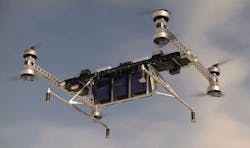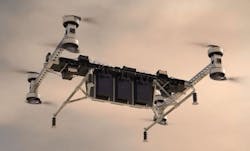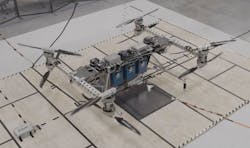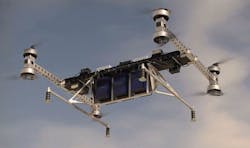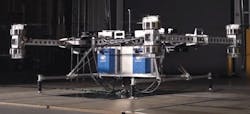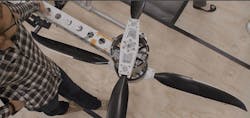Boeing unmanned cargo air vehicle prototype serves as test bed to evolve autonomy, electric propulsion
CHICAGO. Boeing (NYSE:BA) engineers have developed an electric vertical-takeoff-and-landing (eVTOL) multi-copter unmanned aerial vehicle (UAV), also known as an unmanned aircraft system (UAS) or drone, designed to carry up to 500 pounds for potential cargo and logistics applications. The new unmanned electric vertical-takeoff-and-landing cargo air vehicle (CAV) prototype will be used to test and advance Boeing's autonomy and electric propulsion technology building blocks for future aerospace vehicles.
Boeing researchers will use the prototype as a flying test bed to mature the building blocks of autonomous technology for future applications. Boeing HorizonX, with its partners in Boeing Research & Technology, led the development of the CAV prototype, which complements the eVTOL passenger air vehicle prototype aircraft in development by Aurora Flight Sciences, a company acquired by Boeing in late 2017.
A team of Boeing engineers and technicians designed and built the CAV prototype in less than three months. It has completed initial flight tests at Boeing Research & Technology's Collaborative Autonomous Systems Laboratory in Missouri.
"This flying cargo air vehicle represents another major step in our Boeing eVTOL strategy," says Boeing Chief Technology Officer Greg Hyslop. "We have an opportunity to really change air travel and transport, and we'll look back on this day as a major step in that journey."
Powered by an environmentally-friendly electric propulsion system, the CAV prototype is outfitted with eight counter rotating blades allowing for vertical flight. It measures 15 feet long (4.57 meters), 18 feet wide (5.49 meters) and 4 feet tall (1.22 meters), and weighs 747 pounds (339 kilograms).
"Our new CAV prototype builds on Boeing's existing unmanned systems capabilities and presents new possibilities for autonomous cargo delivery, logistics and other transportation applications," adds Steve Nordlund, Boeing HorizonX vice president. "The safe integration of unmanned aerial systems is vital to unlocking their full potential. Boeing has an unmatched track record, regulatory know-how and systematic approach to deliver solutions that will shape the future of autonomous flight."
Chicago-based Boeing is a leading manufacturer of commercial jetliners and defense, space, and security systems. A top U.S. exporter, the company supports airlines and U.S. and allied government customers in 150 countries.
The go-to resource for Intelligent Aerospace technology news & information:
Covering key topics
Across all market segments
Subscribe to the free Intelligent Inbox e-newsletter: http://www.intelligent-aerospace.com/subscribe.html.
Connect on social media:
Keep pace with aerospace innovation and opportunities via your favorite social media channels. Connect with Intelligent Aerospace on Twitter (@IntelligentAero), LinkedIn,Google+, and Instagram.
